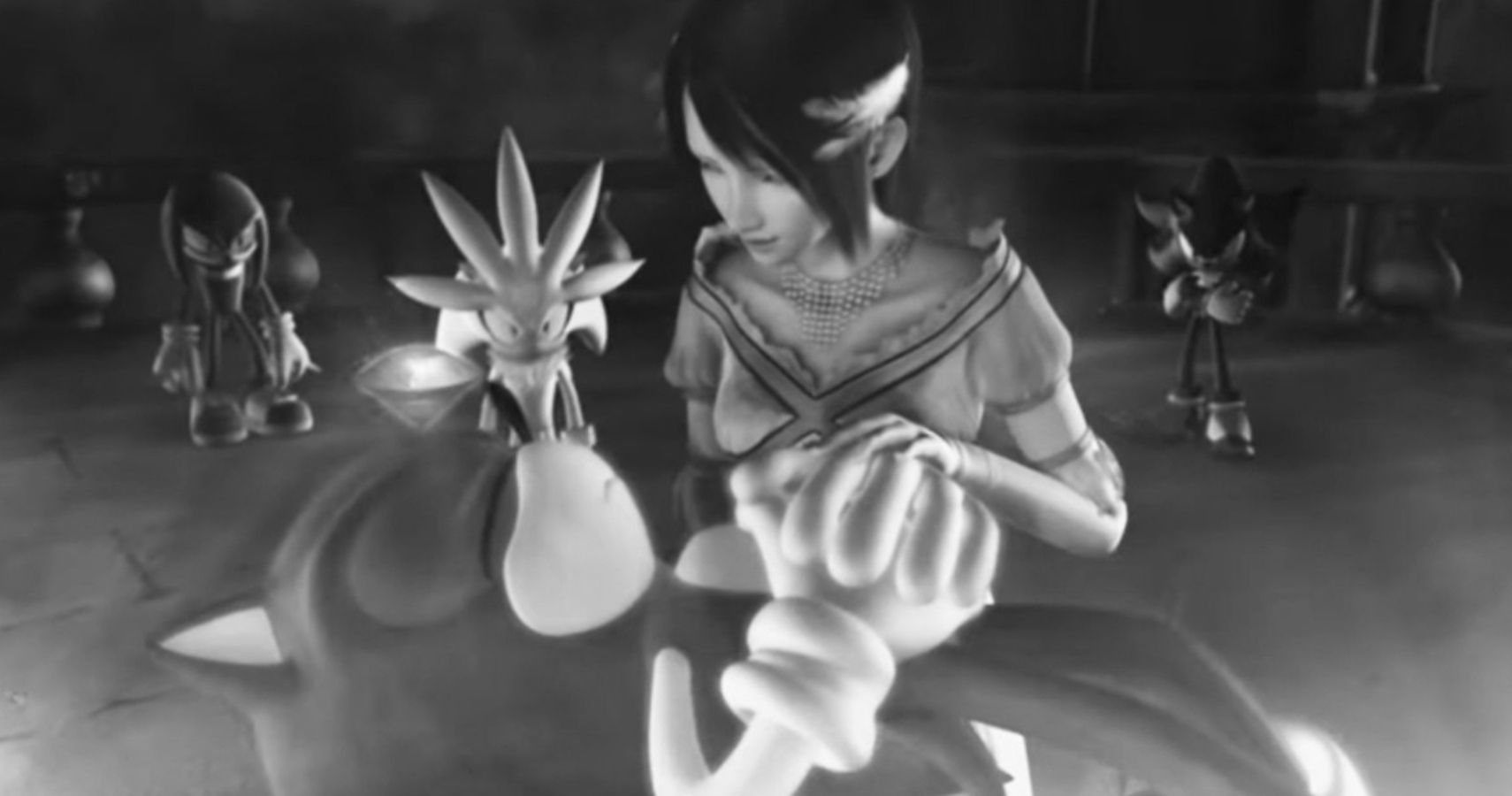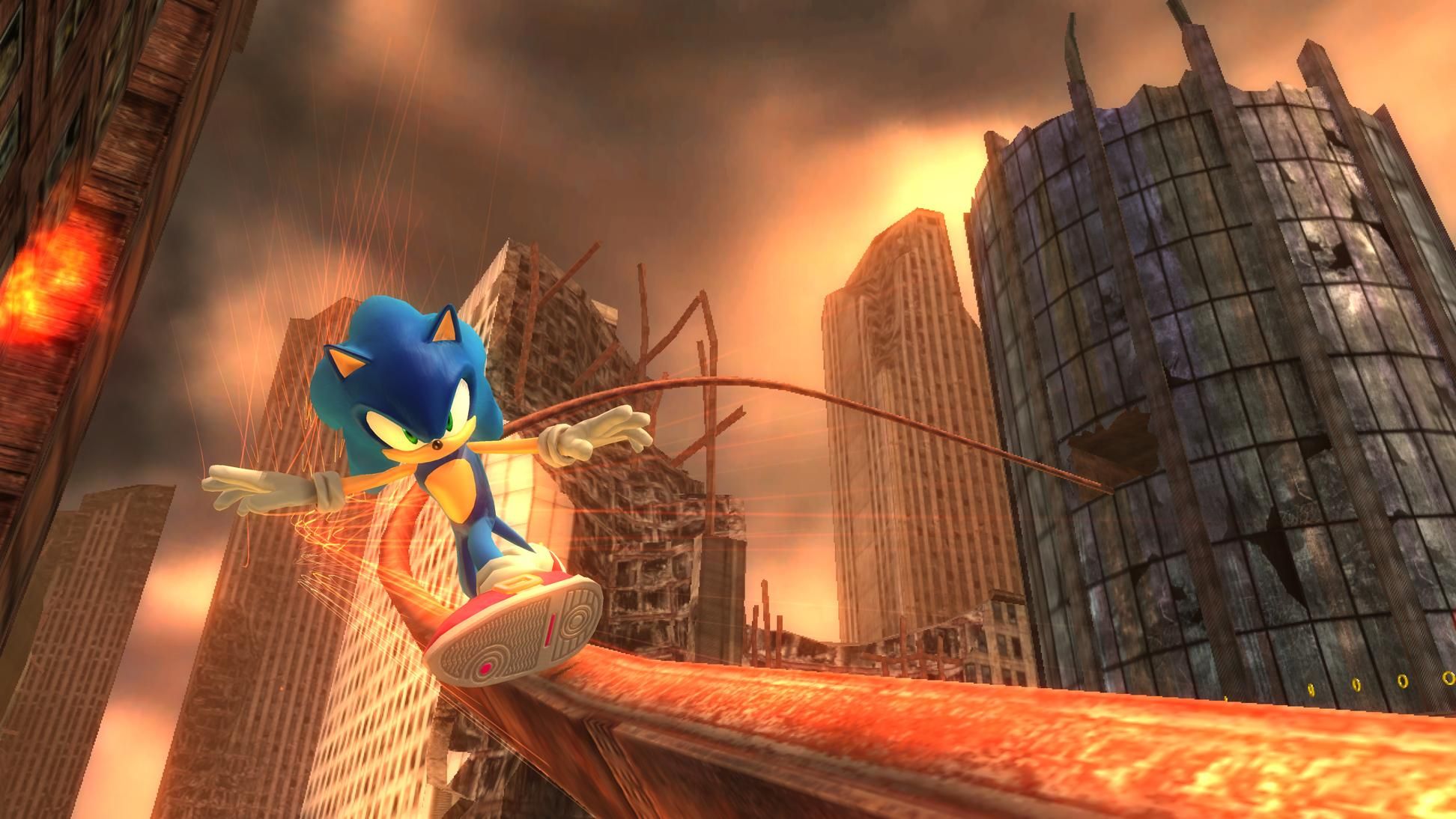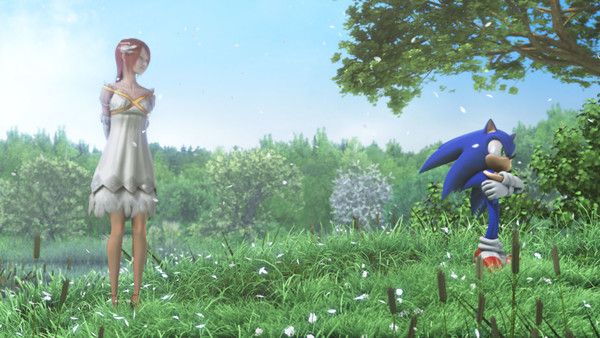2006's Sonic The Hedgehog is the stuff of legends.
It's a game so memetically bad and so technically flawed that it's carved out a spot alongside gaming's worst. Most regard it to be a disaster on every conceivable level, and its negative reputation has hung over the Sonic franchise like a dark cloud for 14 years now. After the Blue Blur enjoyed a long run as Mario's equal, this was the release that finally managed to stop him in his tracks.
But should it have? Since 2010, when I played Sonic '06 for the first time, I was surprised by how playable it was. I was even more surprised at the ambitious narrative and the clever level design, both backed by a killer score and some lovely visuals. Yes, it was flawed - I recognized this. However, when I looked beneath the technical limitations, I could see the glimmers of a brilliant game buried just under the surface.
In the decade since, I've replayed Sonic '06 several times across the PS3 and 360. Not to punish myself, not to laugh at a bad game, not because of any belief that it's a grade-A masterpiece. No, I do it because I see Sonic Team's derided outing not as something funny or terrible, but as something sad. I see its place in gaming history as one of tragedy, and I see the game that shipped not as an unmitigated disaster, but as a rough blueprint for what could have been the game to save Sonic.
At its heart, Sonic '06 is really just a straightforward sequel to 1998's Sonic Adventure. Almost everything about that game, from the hub worlds to the human characters to the multiple protagonists, is translated into the early seventh generation title. But this time, there's more of it to go around - dozens of hours of exploring open worlds, uncovering bits of the story, and speedrunning through different self-contained levels as you try to snag every collectible or get the best time.
What's strange is that this should have worked. Despite what Game Grumps might tell you, Sonic Adventure is a fairly beloved and respected entry in the series. It was a critical and commercial hit at the time, and fans still rank it among the franchise's best outings. Adventure gave a sense of direction to Sonic's trajectory in 3D, and offered an antithesis to the direction Nintendo was taking Mario.
But of course, Sonic Team did what it does best after it has a hit on its hands: switched directions completely. For eight years, the series changed focuses so many times that it became impossible to understand what these games were anymore. Yes, I like Sonic Heroes just fine, and I adore Shadow The Hedgehog, but they're a far cry from the direction suggested by that original burst of creativity.
Which is why, to me, Sonic '06 was such a relief. Here was something informed by that 1998 classic, with a title to suggest a complete rebirth of the series. From early marketing, it seemed like Sega was trying to distance itself from everything that happened after the Dreamcast, and to fully capitalize on the promise of Sonic's first fully 3D outing. And no - I will not dignify Sonic 3D Blast with any sort of acknowledgement.
What happened, then? This should've been the one - the game to make Sonic a big name going into a new generation of consoles, and a clean break from the shaky ground Sonic Team had stood on for quite some time now. Of course, that didn't pan out, but all the pieces were in place, and the team's hearts were set on making this a great game.
Unfortunately, Sonic met his biggest nemesis yet: crunch.
Yes, it's easy to point to Yuji Naka's departure from Sega as the primary catalyst for the game's failure, but I think that's disrespectful to the capable hands of Takashi Iizuka and the rest of Sonic Team - developers that have since proven they can produce winners like Unleashed, Colors, and Generations. It's popular to dunk on the developer these days, but subjectively speaking, I think that's shallow, cruel, and completely disingenuous. There's always a buried lede when it comes to talking about bad games, and much like E.T. wasn't the sole cause of the industry crash, Sonic '06 didn't ship with glaring technical issues because Naka wasn't working on it, or because the team wasn't good enough.
No, the reason Sonic '06 is the way it is lies in Sega's gross mismanagement of developers. After Naka's departure, Sega split Sonic Team down the middle - one team was to work on Sonic '06, while the others would work on the so-so Wii exclusive Secret Rings. That's already a major blow, as the teams had to contend with being short-staffed while revamping Sonic's image for a new generation of consoles. Worst yet, the Sonic '06 team was tasked with making sure the game shipped by the holiday season of 2006. This forced the team to cut corners wherever possible as Sega breathed down their neck, unwilling to relent on their release date.
"We didn't have any time to polish," Iizuka told Game Informer in 2015, "and we were just churning out content as quick as we could."
This is a known story, of course, but I don't think casual audiences or hardcore fans quite understand why this was so bad. The development of Sonic '06 wasn't sloppy or careless, nor was it truly rushed by the team working on it. Instead, corporate suits at the top forced an unrealistic and inhumane deadline onto the team, regardless of how feasible it was. The artistic ambitions of the project, the numerous good ideas at play, the glimmer of hope that Sonic could stand shoulder-to-shoulder with Mario again... these were all buried under the machinations of a executives who just wanted a product to ship out for the holidays. What that product was didn't matter - it only mattered that it a) had Sonic and b) was on the new consoles.
In 2020, this story is all too familiar. As the gaming industry has boomed and game budgets have bloated, too little has been done by too many to address overwork and workplace abuse. Developers like Rockstar, Naughty Dog, and CD Projekt Red enact the same type of unethical treatment on their developers, yet never seem to get punished for it. Why? Because their games haven't failed yet. Because the hardest crunchers of the most successful developers have become the ones calling the shots, and their teams are held to their unorthodox and unrealistic standards. Because the studio heads eager to make their corporate owners happiest have become monoliths that we take seriously, instead of questioning on a critical level. It's similar to how auteurs of the '40s thru '80s were given carte blanche to abuse (and sometimes rape or kill) their cast and crew in order to make "Art."
To call Sonic Team "lazy" for putting out a "rushed" game, then, is to not do justice to the whole situation. Instead, a more useful way to frame Sonic '06 is as a monument to the ultimate failure of crunch. Sega pushing its developers to their very limits in order to ship a game about a cartoon hedgehog tells you everything you need to know about the absurdity of this industry. The publisher made the lives of every person involved a waking nightmare, and forced them into a position where they shipped something they knew to be incomplete. While we may never get a scathing critique of Sega's management from Iizuka and Co., who are still diligently working on the franchise, it's hard to imagine a situation where they were happy about how they were being treated - let alone seeing their ambitious project widely panned at release.
Perhaps it's because of this perspective, then, that Sonic '06 is a game I revisit every few years. Part of it it, sure, is that I do genuinely like it. Its story is flawed but ultimately charming, and it houses some of my favorite level designs in the franchise. Any game that has Crisis City, after all, can't be all bad. Plus, that soundtrack! Point being, I'm not suggesting that we should be nice to a game because the developers worked really hard. Instead, I'm suggesting that what's here is actually good, but it's just marred by so many technical problems that most are put off by. Not too many, though, as the game actually sold gangbusters and got some decent press at the time - something that isn't talked about nearly enough, I might add.
However, my love for the game goes deeper than that. See, I don't love it despite its flaws, but rather because of them. Every bit of breakage, every weird control choice, every cut corner... I can see the hard work of a team strapped for time etched into each bit of code that comprises this game. I can see still see the grand rebirth of Sonic and pals, dulled but still shimmering underneath the symptoms of fatigue that haunt every technical imperfection. Much like one would reevaluate a panned film and resurrect it as a cult classic, I have a great deal of respect for the game Sonic '06 wound up being, and still have loads of reverence for it today.
Laughing at failure is easy. Questioning why it happened is harder. But perhaps the hardest thing, when it comes to art and especially when it comes to gaming, is to appreciate something with its technical imperfections. To see the value of a work beyond whether it's "good" or "bad" based on what your favorite critic says. To truly take something to task on its own merits, not by the rigid standards we judge interactive entertainment by. It's a more interesting way to look at art, and who knows - it just may help revive games long dismissed as "bad."
This is, to me, where games discourse needs to go in order to truly evolve.
Until then? I'll be dreaming of Sonic '06's absolution.




